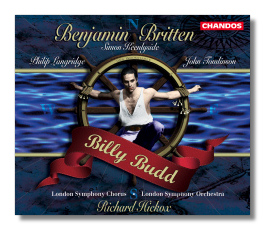
The Internet's Premier Classical Music Source
Related Links
- Britten Reviews
- Latest Reviews
- More Reviews
-
By Composer
-
Collections
DVD & Blu-ray
Books
Concert Reviews
Articles/Interviews
Software
Audio
Search Amazon
Recommended Links
Site News
 CD Review
CD Review
Benjamin Britten

Billy Budd
(Revised version in two acts – 1961)
- Philip Langridge (Captain Vere)
- Simon Keenlyside (Billy Budd)
- John Tomlinson (Claggart)
- Alan Opie (Mr. Redburn)
- Matthew Best (Mr. Flint)
- Alan Ewing (Mr. Ratcliffe)
- Francis Egerton (Red Whiskers)
- Quentin Hayes (Donald)
- Clive Bayley (Dansker)
Tiffin Boys' Choir
London Symphony Orchestra & Chorus/Richard Hickox
Chandos CHAN9826(3) DDD 3CDs: 22:36, 62:17, 79:48
This is the second recording of the two-act version of Billy Budd. (This first was the composer's own recording made for London/Decca in the 1960s.) The other two recordings, a recent one on Erato conducted by Kent Nagano, and a live broadcast from the 1951 world première on VAI, present the opera in four acts. The principal difference between the two versions comes at the end of the original Act I: Captain Vere addresses his crew and thereby establishes the bond between him and the men under his command. This is cut in the revised version. I haven't heard anyone screaming over the loss, but if you're a Britten completist, you'll want both the four-act and two-act versions anyway. At any rate, it seems clear that Britten came to prefer the two-act version presented here.
Although it was recorded in a studio (actually, Blackheath Halls) in December 1999, this recording is based on a concert performance given in Barbican Hall. It has its weaknesses and strengths. Hickox has developed into a conductor with clear sympathy for Britten's biggest scores, and this recording follows previous Chandos releases of Peter Grimes, The Rape of Lucretia, Paul Bunyan, and the War Requiem. While they have received generally good reviews, one charge that has been leveled against Hickox's Britten recordings is their lack of theatricality. Such is the case here; even if Chandos hadn't told us, we would have known that this recording's genesis was not the stage. While Hickox can't muster up the requisite drama, he is excellent at suggesting the darkness of this opera's themes – Evil and being "lost on the infinite sea." He's faithful to Britten's letter, if not to his spirit.
Among the three principals, Evil, in the form of Master-at-Arms John Claggart, is dominant. He has an impressive voice, and his unpredictable mood swings – suavity suddenly veering to cynicism and fits of violent anger – make him a character to be frightened of. When his big moment finally comes – "Oh beauty, oh handsomeness, goodness" near the end of Act One – Tomlinson takes advantage of the opportunity to sing his Iago's credo with Verdian style. Vocally, Philip Langridge as Captain Vere is a more convincing naval hero than Peter Pears, but it was Pears who caught the moral dilemma of this character; his Vere was cursed to be an intellectual and a sensitive man in situation where intelligence and sensitivity were not needed. Langridge is sympathetic and he sings very well, but he does not balance Tomlinson's Claggart.
It takes a special singer to be truly successful in the title role. He needs to be immediately likeable, and to have charisma like a lighthouse has light. He also needs to be naïve to a fault. The first Billy Budd, Theodore Uppman, is said to have captured these qualities perfectly, and Thomas Hampson also is the cynosure of the Erato recording. Keenlyside's Billy Budd is just a good person to whom bad things happen. His beautiful singing voice earned him this part – his scene in irons before being hanged is a demonstration of supreme vocal control – and his Billy Budd is masculine and honest. His goodness never was any match for Claggart, though, and the opera's drama goes out the scuppers when its outcome is so obvious from the outset.
The supporting roles are done more or less successfully, within the almost oratorio-like concept. The cast list is a sort of "Who's who among contemporary English male singers." More could have been done to create character through accents. On the composer's studio recording, the singer who was cast in the tiny role of Arthur Jones was memorable from the moment he opened his mouth. That kind of dramatic detail is what this Chandos recording needs. The stars of the show, then, beyond Tomlinson, are the orchestra and chorus. The best moment of this set is the interlude between Scenes 2 and 3 in Act One, with the sound of moonlight on the water, the gentle heaving of the terrifying sea, and sailors below-decks keeping their courage up singing by sea chanteys. This raised gooseflesh with its elemental power.
Chandos is selling these three discs for the price of two. The booklet contains the English text with French and German translations and a good essay by Michael Kennedy; unfortunately, my copy of the booklet began falling apart almost immediately. The production and engineering team of Brian and Ralph Couzens has done its customarily fine job here.
Copyright © 2000, Raymond Tuttle


















